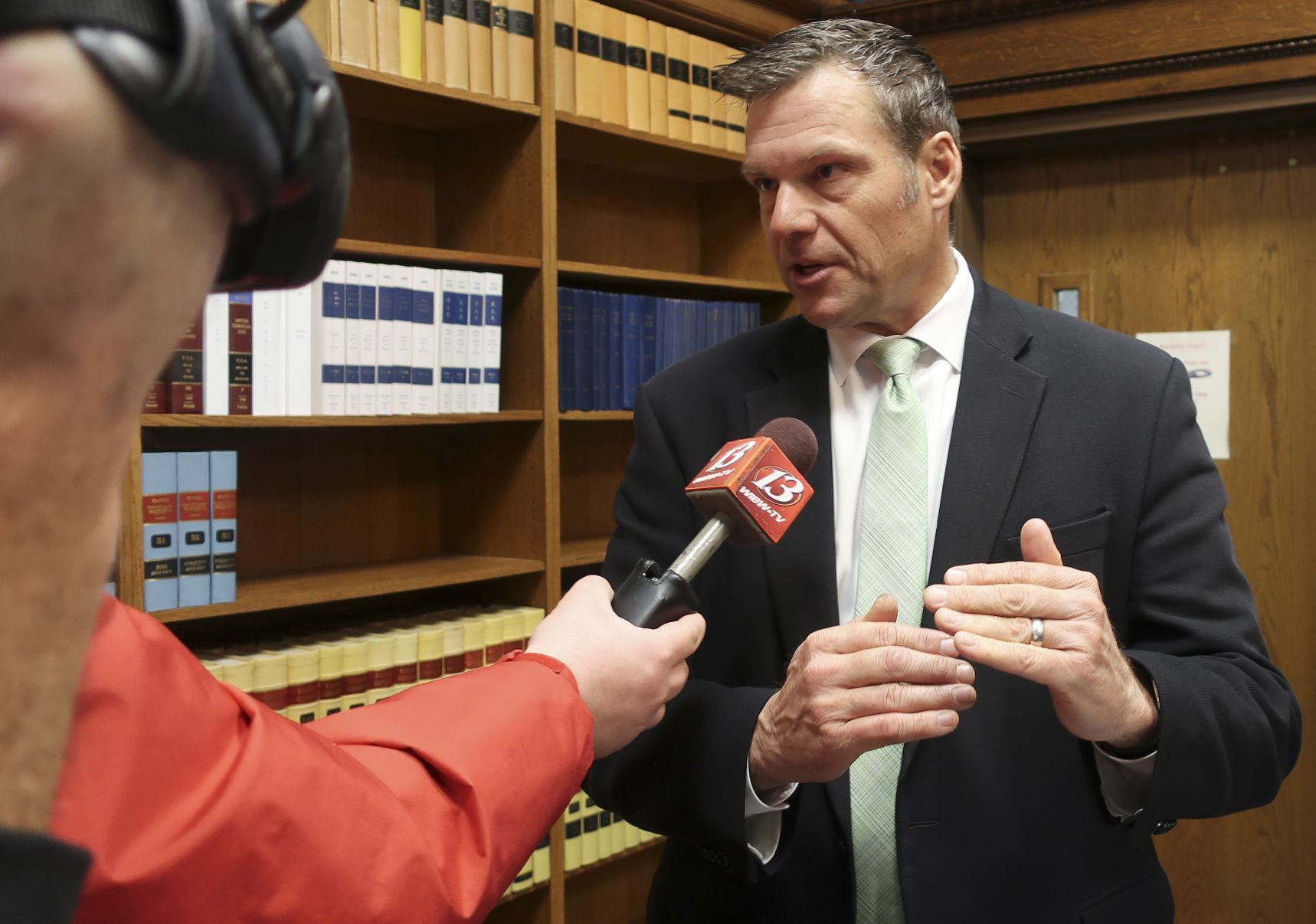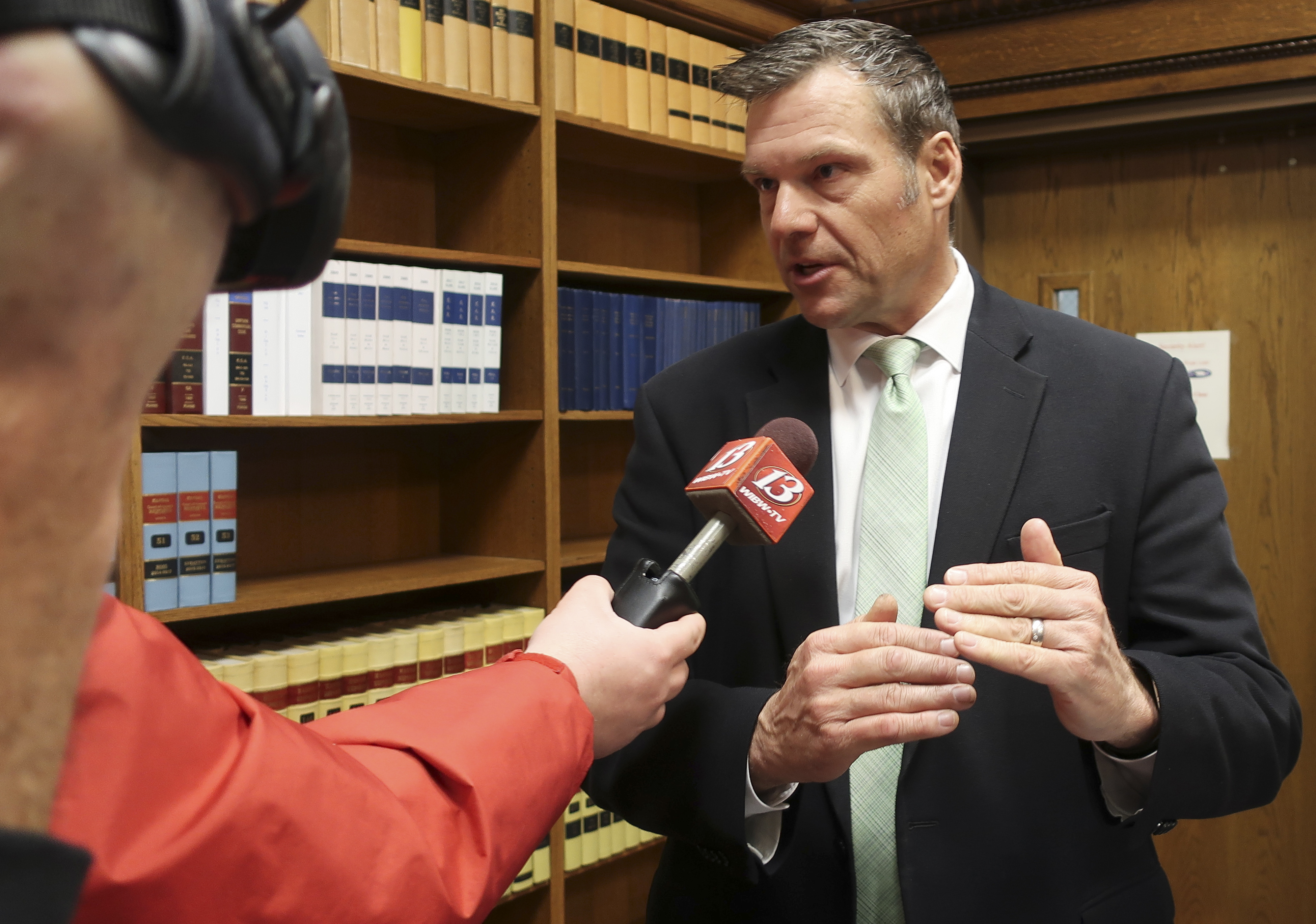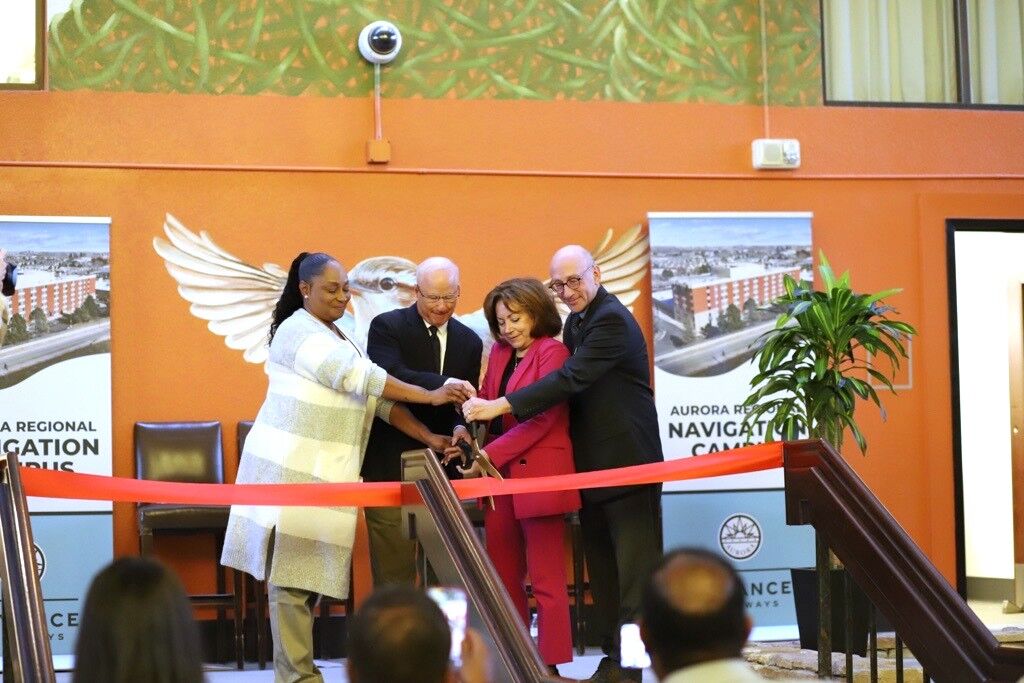OUT WEST ROUNDUP | Kobach considering 2020 US Senate bid in Kansas

KANSAS
Kobach considering US Senate bid in 2020
TOPEKA, Kansas – Kris Kobach, a vocal ally of President Donald Trump and an advocate of tough immigration laws, has confirmed he is considering a run for the U.S. Senate in 2020 after losing the Kansas governor’s race.
Kobach, the former Kansas secretary of state, joins a crowded field of Republicans who are either actively looking at the race or being touted as possible candidates. The list also includes U.S. Secretary of State Mike Pompeo.
Kansas Sen. Pat Roberts, a four-term Republican, announced in early January that he would not seek re-election.
Kobach said he does not have a timetable for making his decision and does not know how talk about Pompeo getting into the race would affect it.
Pompeo is a former congressman who represented a Wichita-area district in the U.S. House for six years before Trump appointed him CIA director. He became a trusted adviser, and Trump named him U.S. secretary of state when Rex Tillerson left.
Kobach served eight years as Kansas secretary of state and lost the governor’s race to Democrat Laura Kelly. He built a national profile – and alienated moderate Republicans – with his views on immigration and advocacy of strict voter identification laws.
He was an early supporter of Trump’s presidential campaign in 2016, advised the campaign and later the White House, and served as vice chairman of a short-lived presidential commission on election fraud. Kobach had Trump’s endorsement in the governor’s race.
Kobach declined to say whether he has talked to Trump about a job in the administration.
NEW MEXICO
Proposal could make New Mexico a sanctuary state
SANTA FE – New Mexico, the state with the largest percentage of Hispanic residents in the nation, could be the latest jurisdiction to adopt sanctuary status regarding immigrants under a Democratic plan.
Proposals introduced in the New Mexico House and Senate say state agencies would be barred from cooperating with federal immigration authorities seeking to hold or deport immigrants suspected of being in the U.S. illegally.
The authority of sheriffs and jails to hold federal immigrant detainees also would see new limits.
In addition, state agencies couldn’t use public funds to help federal authorities in “detecting, apprehending, arresting, detaining or prolonging the detention of a person” facing possible deportation.
A number of New Mexico cities and towns have declared themselves sanctuaries. Activists have pressed communities nationwide for the declaration amid immigration enforcement proposals by President Trump.
Immigrants would be more likely to report crimes if they know that local law enforcement won’t enforce federal immigration laws, said Emmanuelle “Neza” Leal-Sanchez, a spokesman for immigrant advocacy group Somos Un Pueblo Unido.
But Republican Rep. Alonzo Baldonado of Los Lunas said such a law would make New Mexico less safe.
Democrats recently extended their majority in the state House, and immigrant advocates are hopeful that Democratic Gov. Michelle Lujan Grisham would sign such a proposal.
Grisham has spoken in favor of immigrant rights but didn’t mention immigration in her State of the State address.
NEBRASKA
Industry wary of alternatives tries to protect the word ‘meat’
LINCOLN, Nebraska – A few months after Missouri became the first U.S. state to regulate the term “meat” on product labels, Nebraska’s powerful farm groups are pushing for similar protection from veggie burgers, tofu dogs and other items that look and taste like real meat.
Nebraska lawmakers will consider a bill this year defining meat as “any edible portion of any livestock or poultry, carcass, or part thereof” and excluding “lab-grown or insect or plant-based food products.” It would make it a crime to advertise or sell something “as meat that is not derived from poultry or livestock.”
The measure comes amid a debate over what to call products that are being developed using the emerging science of meat grown by culturing cells in a lab. Supporters of the science are embracing the term “clean meat” – language the conventional meat industry strongly opposes.
The issue strikes a particularly strong chord in Nebraska, where cars roll down the interstate with “Beef State” license plates and the governor each year proclaims May as “Beef Month.”
Farm groups have found an unusual ally in state Sen. Carol Blood, a city-dwelling vegetarian from the Omaha suburb of Bellevue. Blood, who grew up on a farm, said she introduced the measure because agriculture is Nebraska’s largest industry and needs to be protected for the good of the whole state.
Nebraska led the nation in commercial red meat production in 2017 and had the most feed cows as of last year, according to the U.S. Department of Agriculture.
Critics say the bill infringes on the free-speech rights of companies that produce vegetarian alternatives to real meat.
Blood said she proposed the measure after seeing two women in a grocery store who couldn’t tell whether a product contained meat or a substitute. She said her proposal wouldn’t require inspections of product labels, as Missouri’s law does.
WYOMING
Bill to hike animal cruelty fines dies in state Senate
Two of the nation’s largest animal rights organizations routinely rank Wyoming in the bottom five for animal protection laws – and it doesn’t appear that status will be changing anytime soon.
A bill that would have increased the fines for those convicted of animal cruelty has died in the Wyoming Senate by a vote of 7 to 21.
In Wyoming, cruelty to animals is a misdemeanor punishable by a fine of not more than $750. Aggravated cruelty to animals is a felony punishable by a fine of not more than $5,000.
The bill, which was proposed by Sen. Mike Gierau, D-Jackson, would have increased the maximum fine for animal cruelty to $2,500 and the maximum fine for aggravated animal cruelty to $10,000.
Sen. Brian Boner, R-Douglas, said he voted down the bill because he didn’t believe it would achieve its desired objective of preventing animal abuse. Most animal cruelty cases are really just a matter of neglect, he said, and most people only neglect their pets because they cannot afford to properly care for them.
The senator said he was also worried about how the bill would affect the agricultural community, as some “common agricultural practices” are considered cruel by some people.
Lisa Kauffman, the Humane Society’s Idaho director who’s also temporarily serving Wyoming, would eventually like to see a bill that requires animal abusers to undergo counseling because people who torture animals often have underlying mental illnesses or anger management problems.
The Animal Legal Defense Fund, a national legal advocacy organization for animals, and the Humane Society of the United States both cited Wyoming as one of the five worst states in the nation for animal protections in 2017.
MONTANA
Former US Interior boss takes job at investment company
BILLINGS, Montana – Former U.S. Interior Secretary Ryan Zinke said last week he’s “glad to be out of the swamp” after taking a job at a private investment company in the wake of his resignation and amid unresolved ethics investigations into his actions while in President Trump’s Cabinet.
North Carolina-based Artillery One said that Zinke had been hired as its managing director to pursue “investing opportunities” in energy, financial technology and cybersecurity. Company chief executive Daniel Cannon declined to identify any of the firm’s clients or any investment projects in which it has been involved.
Zinke told The Associated Press he had “joined a winning team” following his previous service as a Navy SEAL, a Republican state lawmaker and Montana’s sole member the U.S. House of Representatives. There has been speculation Zinke would run for Montana governor, although he said recently he won’t be seeking public office in the next election cycle.
After spending almost two years leading an agency that oversees 500 million acres of public lands, Zinke announced his resignation from the Interior Department in December and left the post on Jan. 2. He’s denied any wrongdoing amid investigations into his private business dealings, a decision to block a tribal casino and other matters.
Zinke’s tenure in Trump’s Cabinet was marked by a shift toward policies more favorable to the oil and gas industry. Artillery One cited his “expertise in the energy and technology sectors” as a reason for his hiring.















